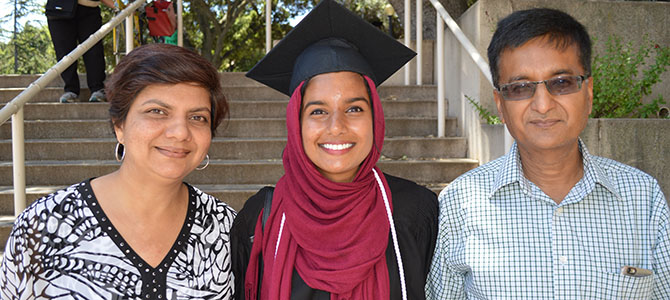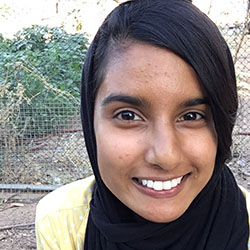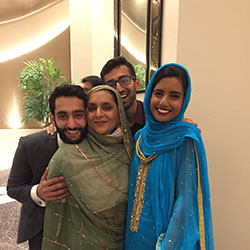
White Coat Profile: Rebia Khan

The White Coat Ceremony marks the first time a medical student will don his or her white coat, the defining symbol of a physician. The coat bestows a great honor, and with it comes a responsibility to uphold the trust of every patient they will encounter. The Class of 2023 will receive their white coats Friday, July 19, during a ceremony that begins at 3:30 p.m. at Symphony Hall in downtown Phoenix.
Meet Rebia Khan

Khan graduated from Stanford University in 2016 with a degree in ecology and evolutionary biology. Her research focused on animal behavior, specifically the behavior of ant colonies. After graduation, she completed a public health internship at a refugee resettlement agency.
Path toward Medicine
“I was always fascinated by biology and how living systems work,” she said. “I knew I had to be in a career that involved science and discovery of the natural world. As I went through various research jobs, I realized I wanted more human connection. I ultimately chose medicine because it connected scientific rigor with human faces and human stories. I am grateful for the platform that medicine will give me to advocate for vulnerable people.”
Choosing the College of Medicine – Phoenix

Born and raised in Phoenix, Khan is committed to practicing in Arizona. The UA College of Medicine – Phoenix was her first choice.
“I applied to the College of Medicine – Phoenix because I wanted a medical school that would train me to serve the unique health needs of Arizona,” Khan said. “After interviewing and interacting with the school, I discovered how innovative and student-centered it is. It was so clear that this was a school that would support my well-being and career goals.”
Volunteer and Research Experience
Khan’s research experience was mostly in animal behavior. She studied the chemical and behavioral signals that allowed ants to communicate within a colony.
“Amazingly, this complex signaling network has many parallels to the neurons in our brain,” Khan said. “After I graduated, I conducted research at the University of Chicago. There, I studied the evolution of color vision in the avian eye through genetic analysis.”
Along with her volunteer experience in wildlife rehabilitation, she served as a tutor with RISE (Refugee Integration, Stability and Education). The group tutors refugee students K-12 in the greater Phoenix area.
“I have been with RISE for the last three years,” she said. “It has been such a joy to get to know our students and watch them grow. Being a part of their lives has given me a window into the refugee youth experience and shown me the tremendous resilience of this population.”
Interesting Fact about Khan
The first patients Khan ever treated were songbirds and raptors at a wildlife rehabilitator. She spends one evening each week at Liberty Wildlife Rescue, where she wraps wings, cleans wounds and conducts physical exams on animals from baby cottontail rabbits to red-tailed hawks.
“I have been involved in wildlife rehabilitation since I was in high school, and it is one of my greatest passions,” she said. “I love that I am able contribute to the well-being of our natural environment in such a hands-on way, though I am excited to move on to patients that don’t have talons.”
What does the white coat mean to you?
“The white coat symbolizes the responsibility we have to our patients and to society,” Khan said. “As students of medicine, we are uniquely endowed with the knowledge of the inner workings of the body and mind. The white coat represents not only our role as society’s healers, but also our responsibility as the ethical and scientifically-founded voices that guide decisions and protect the vulnerable.”
Topics
About the College
Founded in 2007, the University of Arizona College of Medicine – Phoenix inspires and trains exemplary physicians, scientists and leaders to advance its core missions in education, research, clinical care and service to communities across Arizona. The college’s strength lies in our collaborations and partnerships with clinical affiliates, community organizations and industry sponsors. With our primary affiliate, Banner Health, we are recognized as the premier academic medical center in Phoenix. As an anchor institution of the Phoenix Bioscience Core, the college is home to signature research programs in neurosciences, cardiopulmonary diseases, immunology, informatics and metabolism. These focus areas uniquely position us to drive biomedical research and bolster economic development in the region.
As an urban institution with strong roots in rural and tribal health, the college has graduated more than 1,000 physicians and matriculates 130 students each year. Greater than 60% of matriculating students are from Arizona and many continue training at our GME sponsored residency programs, ultimately pursuing local academic and community-based opportunities. While our traditional four-year program continues to thrive, we will launch our recently approved accelerated three-year medical student curriculum with exclusive focus on primary care. This program is designed to further enhance workforce retention needs across Arizona.
The college has embarked on our strategic plan for 2025 to 2030. Learn more.